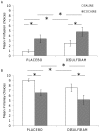The impact of disulfiram treatment on the reinforcing effects of cocaine: a randomized clinical trial
- PMID: 23144826
- PMCID: PMC3493584
- DOI: 10.1371/journal.pone.0047702
The impact of disulfiram treatment on the reinforcing effects of cocaine: a randomized clinical trial
Abstract
Background: Clinical trials indicate that disulfiram (250 mg/d) reduces cocaine use, though one study found that treatment with lower doses of disulfiram (62.5 and 125 mg/d) increased cocaine use. We conducted the present study to better understand how disulfiram alters the reinforcing effects of cocaine in cocaine users.
Methods: Seventeen non-treatment seeking, cocaine-dependent volunteers participated in this double-blind, placebo-controlled, laboratory-based study. A cross-over design was utilized in which participants received placebo in one phase and disulfiram (250 mg/d) in the other. Following three days of study medication participants completed two choice sessions. In one they made 10 choices between receiving an intravenous infusion of saline or money that increased in value (US$ 0.05-16) and in the other cocaine (20 mg) or money.
Results: Participants chose cocaine more than saline under both disulfiram and placebo conditions (p<0.05). Unexpectedly, disulfiram increased both the number of cocaine and saline infusion choices (p<0.05). We next examined the relationship between disulfiram dose and cocaine choices. Disulfiram dose (mg/kg bodyweight) was negatively correlated with number of choices for cocaine (p<0.05). Disulfiram also enhanced cocaine-induced increases in cardiovascular measures (p's<0.05-0.01).
Conclusions: Disulfiram's impact on the reinforcing effects of cocaine depends on dose relative to body weight. Our results suggest that the use of weight-based medication doses would produce more reliable effects, consistent with weight-based dosing used in pediatrics and in preclinical research.
Trial registration: Clinicaltrials.gov NCT00729300.
Conflict of interest statement
Figures



References
-
- SAMHSA (2010) Substance Abuse and Mental Health Services Administration. Results from the 2009 National Survey on Drug Use and Health: Volume I. Summary of National Findings.. Available: http://www.oas.samhsa.gov/NSDUH/2k9NSDUH/2k9ResultsP.pdf.
-
- Haile CN, Mahoney JJ, Newton TF, De La Garza R (2012) Pharmacotherapeutics directed at deficiencies associated with cocaine dependence: Focus on dopamine, norepinephrine and glutamate. Pharmacol Ther 134: 260–277 doi:10.1016/j.pharmthera.2012.01.010. - DOI - PMC - PubMed
-
- Major LF, Lerner P, Ballenger JC, Brown GL, Goodwin FK, et al. (1979) Dopamine-beta-hydroxylase in the cerebrospinal fluid: relationship to disulfiram-induced psychosis. Biol Psychiatry 14: 337–344. - PubMed
-
- Hoeldtke RD, Stetson PL (1980) An in vivo tritium release assay of human dopamine beta-hydroxylase. J Clin Endocrinol Metab 51: 810–815. - PubMed
-
- Goldstein M, Anagnoste B, Lauber E, Mckeregham MR (1964) Inhibition of dopamine-beta-hydroxylase by disulfiram. Life Sci 3: 763–767. - PubMed
Publication types
MeSH terms
Substances
Associated data
Grants and funding
LinkOut - more resources
Full Text Sources
Medical

